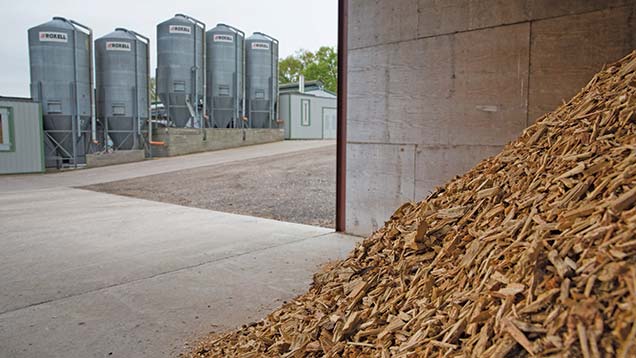Biomass projects – an installation checklist
 © Tim Scrivener
© Tim Scrivener There are areas in which problems commonly arise with any renewable energy project and rushing to beat degression deadlines only increases the likelihood of this.
Renewable Energy Association figures show more than 50% have at least one problem during installation. The main issues and their resolutions include:
Underground pipework
Digging pipe routes without first carrying out surveys first to identify existing services, trenches filling with water when exposed, failure to agree pipe routes prior to contract signature – all of these cause problems. Carry out a detailed discussion with the installer before signing a contract. Make sure pipes are installed correctly in accordance with manufacturers’ recommendation – they will be in the ground for the next 20-30 years and need to be compliant for your warranty.
Health and safety
A large proportion of projects will come under construction, design and management regulations – ensure you are fully covered by employing a CDM co-ordinator to mitigate liability.
Point of contact during installation
Many issues arise through lack of clear communication channels during installation, so that if a problem arises it takes longer to resolve. This is especially true when multiple contractors are involved. Who is responsible for what? So, if you have multiple contracts, ensure you have set out clear boundaries for each task and ensure that everything is defined with no overlaps or gaps. Hold a pre-construction meeting with all contractors to ensure all aspects are covered, unknowns are highlighted and risks to project delivery are identified.
Project programme
Programme slip is a higher risk with multiple contractors. If you don’t have project management experience, employ someone to undertake contract administration, chair project meetings and ensure contractors are complying with the contractual terms.
Contract and terms and conditions
Many contracts and T&Cs are heavily weighted towards protecting the installer and not the client. Before you sign, get someone with in-depth understanding to review all documents to ensure a fair deal.
Fuel delivery
Believe it or not, many installations are carried out without any consideration of how to get fuel into the system. Get a fuel supplier to visit the site prior to installation. They will provide free advice on the practicalities of getting fuel to your site. Those planning to supply their own fuel can identify practical issues by getting a chipping contractor to visit and assess the site.
Fuel processing
Discuss with your installer how to get fuel from A to B to C – if they don’t have practical knowledge of this then they are not biomass installers. Woodfuel is cheap, but make sure you understand all the costs associated with it, including your time. Discuss this with someone with an understanding of fuel processing and for all aspects of a project – visit others who are already up and running and who have the same or similar kit to that which you propose.
Electricity costs
Biomass systems are meant to run efficiently and with limited electricity input, but this cost is often higher than many anticipate. Don’t take the installer’s word for it, visit existing installations to get a realistic assessment of running costs.
Post-installation snagging
Once the system is up and running, itemise any work outstanding with the installer and agree a timescale to get this completed. Make sure the contract allows you to withhold money until you are happy it is completed to your 100% satisfaction and/or to what the contract says they will deliver.
RHI applications
These often take longer to complete than anticipated. Who is responsible for the submission? Applications are returned due to incorrect information, inconsistency in information, incorrect heat meter positioning, serial numbers not matching and so on.
Post-RHI obligations
Do you understand these? The main ones are quarterly meter reading and keeping fuel records.
Timescales
Don’t fall for false promises and unrealistic timescales – get a proper breakdown of installation works and timescales specific to your project and sense check these with others who have been through the process.
Training and maintenance
Are you going to be properly trained up on your new system? Do you understand what is involved in maintaining it? Ideally get two training sessions, an initial one and a follow-up, as there is a lot to take in.
Variations to original spec
There will always be some variations – the key is to ensure you are not signing up to a cheap deal to then be hit with costs the installer has either hidden or, due to inexperience, didn’t realise would be required. It is vital to choose an installer with a good reputation and plenty of experience
Substituting key components: Make sure what you sign up to is actually installed – key items such as pumps, underground pipe, boilers and so on can have a long lead time from the manufacturer, so installers can be tempted to substitute sub-standard items due to shorter lead times. Don’t be caught out – have a good itemised breakdown of key items.
Planning permission, building regulations/warrant and flue emissions are often overlooked – get advice on these areas, which may need permissions or official checks.
